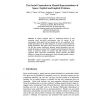Free Online Productivity Tools
i2Speak
i2Symbol
i2OCR
iTex2Img
iWeb2Print
iWeb2Shot
i2Type
iPdf2Split
iPdf2Merge
i2Bopomofo
i2Arabic
i2Style
i2Image
i2PDF
iLatex2Rtf
Sci2ools
106
click to vote
COSIT
2011
Springer
2011
Springer
The Social Connection in Mental Representations of Space: Explicit and Implicit Evidence
If spatial cognition hopes to understand memory of and reasoning about real-world environments, then all aspects of the environment, both spatial and non-spatial need to be considered. Nonspatial information can be either integral to or merely associated with the spatial information. This paper reviews two lines of research conducted in our lab that explore interactions between spatial information and nonspatial information associated with it (namely social information). Based on results of numerous studies, we propose that full accounts of spatial cognition about real-world environments should consider non-spatial influences, noting that some phenomena, while seemingly spatial in nature, may have substantive non-spatial influences.
| Added | 18 Dec 2011 |
| Updated | 18 Dec 2011 |
| Type | Journal |
| Year | 2011 |
| Where | COSIT |
| Authors | Holly A. Taylor, Qi Wang, Stephanie A. Gagnon, Keith B. Maddox, Tad T. Brunyé |
Comments (0)

